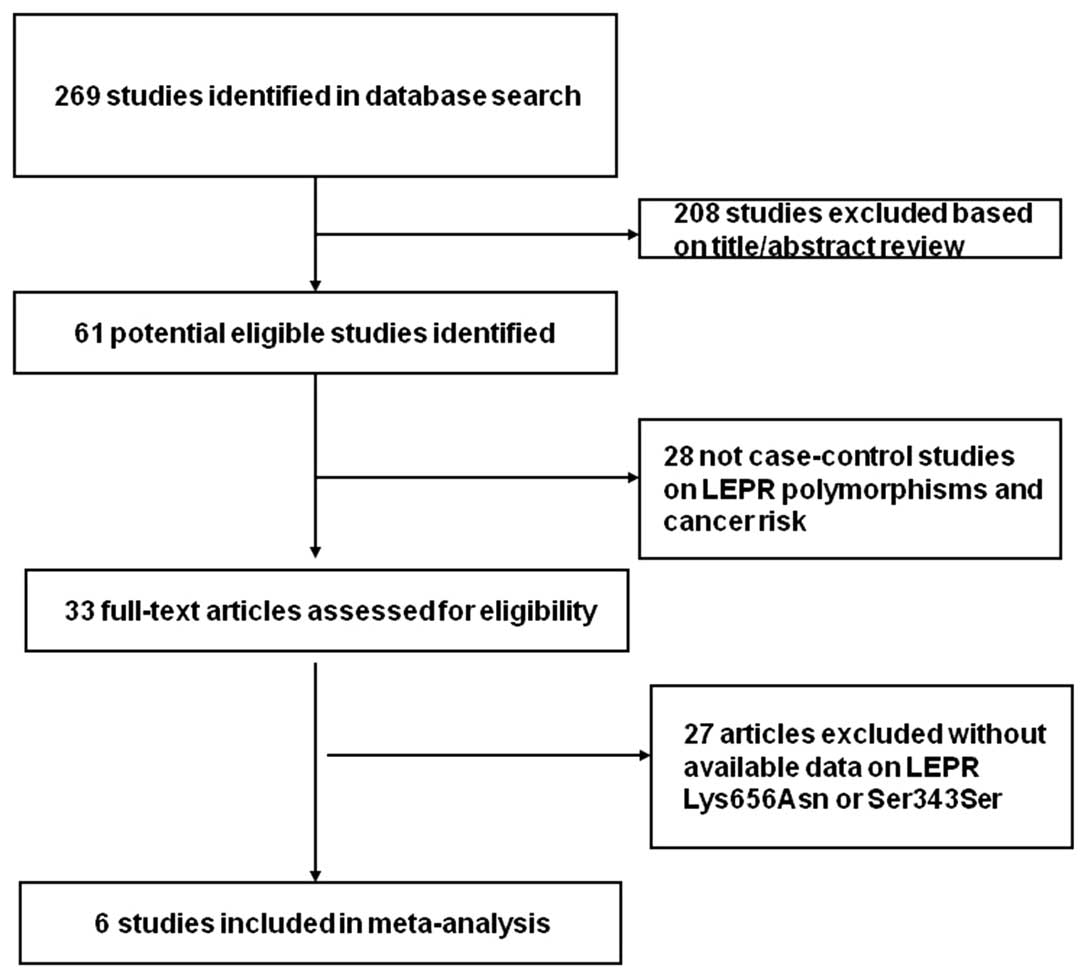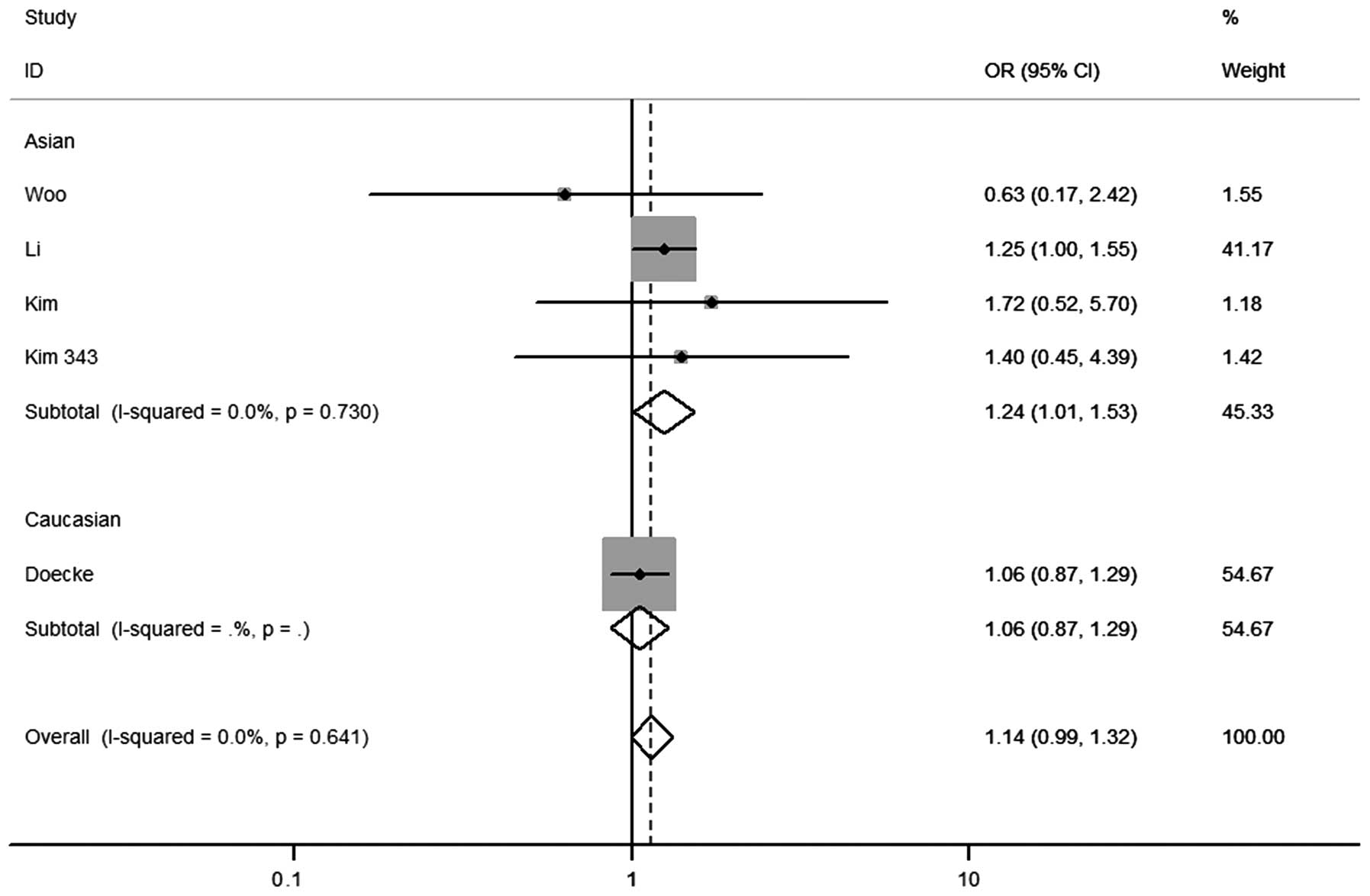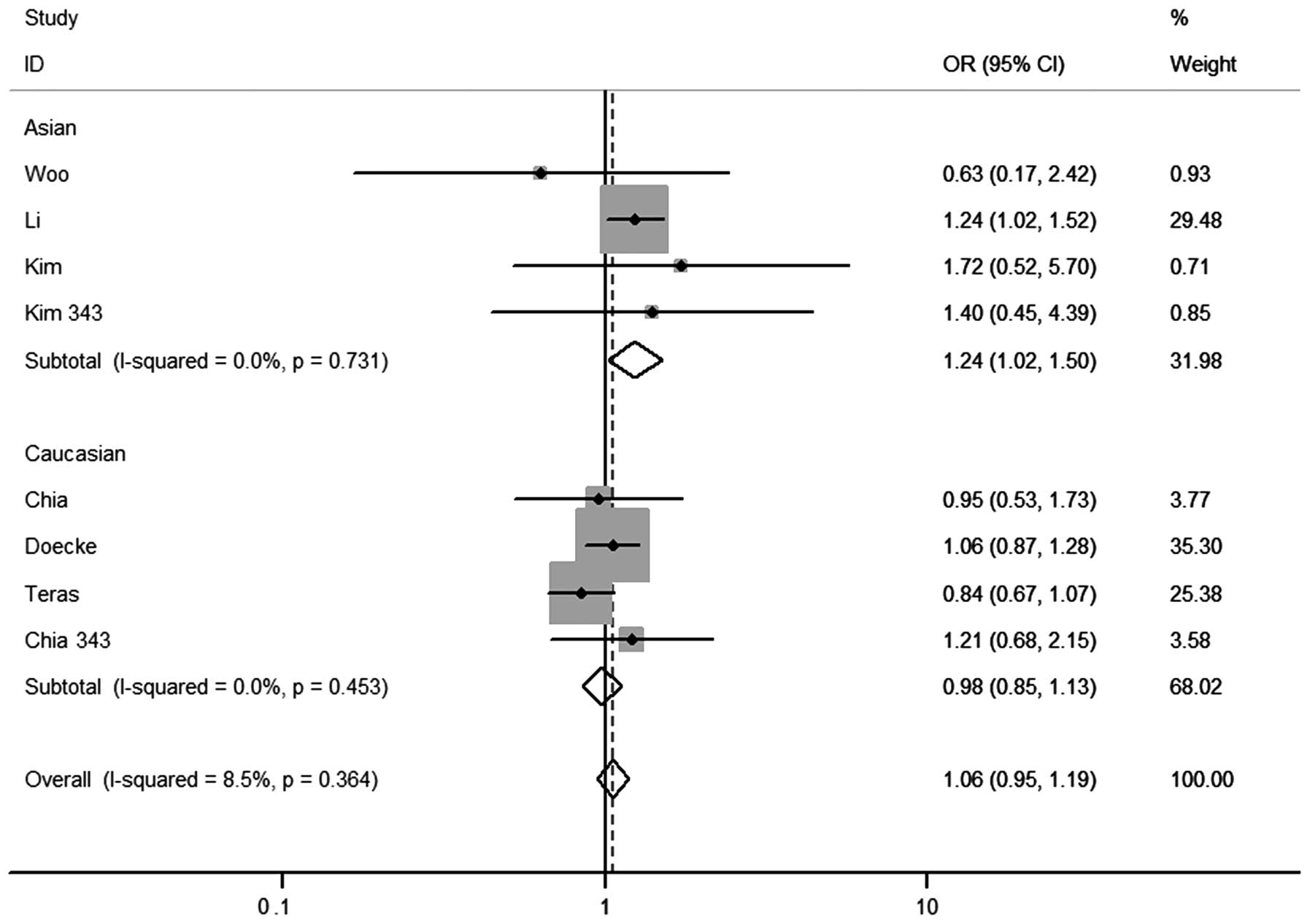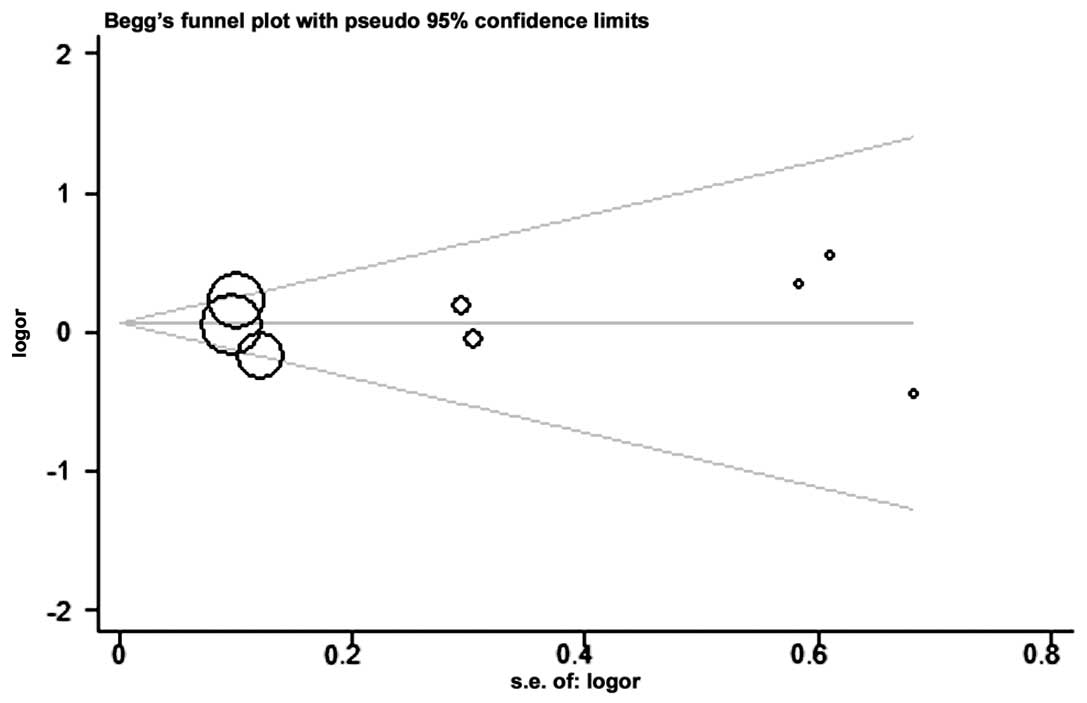|
1
|
Siegel R, Naishadham D and Jemal A: Cancer
statistics, 2012. CA Cancer J Clin. 62:10–29. 2012. View Article : Google Scholar
|
|
2
|
Wright ME, Peters U, Gunter MJ, et al:
Association of variants in two vitamin e transport genes with
circulating vitamin e concentrations and prostate cancer risk.
Cancer Res. 69:1429–1438. 2009. View Article : Google Scholar : PubMed/NCBI
|
|
3
|
Cheung WY and Liu G: Genetic variations in
esophageal cancer risk and prognosis. Gastroenterol Clin North Am.
38:75–91. 2009. View Article : Google Scholar : PubMed/NCBI
|
|
4
|
Friedman JM and Halaas JL: Leptin and the
regulation of body weight in mammals. Nature. 395:763–770. 1998.
View Article : Google Scholar : PubMed/NCBI
|
|
5
|
Unger RH, Zhou YT and Orci L: Regulation
of fatty acid homeostasis in cells: novel role of leptin. Proc Natl
Acad Sci USA. 96:2327–2332. 1999. View Article : Google Scholar : PubMed/NCBI
|
|
6
|
Lakka HM, Oksanen L, Tuomainen TP, Kontula
K and Salonen JT: The common pentanucleotide polymorphism of the
3′-untranslated region of the leptin receptor gene is associated
with serum insulin levels and the risk of type 2 diabetes in
non-diabetic men: a prospective case-control study. J Intern Med.
248:77–83. 2000.
|
|
7
|
Lönnqvist F, Arner P, Nordfors L and
Schalling M: Overexpression of the obese (ob) gene in adipose
tissue of human obese subjects. Nat Med. 1:950–953. 1995.PubMed/NCBI
|
|
8
|
Yiannakouris N, Yannakoulia M, Melistas L,
Chan JL, Klimis-Zacas D and Mantzoros CS: The Q223R polymorphism of
the leptin receptor gene is significantly associated with obesity
and predicts a small percentage of body weight and body composition
variability. J Clin Endocrinol Metab. 86:4434–4439. 2001.
View Article : Google Scholar : PubMed/NCBI
|
|
9
|
Snoussi K, Strosberg AD, Bouaouina N, Ben
Ahmed S, Helal AN and Chouchane L: Leptin and leptin receptor
polymorphisms are associated with increased risk and poor prognosis
of breast carcinoma. BMC Cancer. 6:382006. View Article : Google Scholar : PubMed/NCBI
|
|
10
|
Liu CL, Chang YC, Cheng SP, et al: The
roles of serum leptin concentration and polymorphism in leptin
receptor gene at codon 109 in breast cancer. Oncology. 72:75–81.
2007. View Article : Google Scholar : PubMed/NCBI
|
|
11
|
Han CZ, Du LL, Jing JX, et al:
Associations among lipids, leptin, and leptin receptor gene
Gin223Arg polymorphisms and breast cancer in China. Biol Trace Elem
Res. 126:38–48. 2008. View Article : Google Scholar : PubMed/NCBI
|
|
12
|
Ribeiro R, Vasconcelos A, Costa S, et al:
Overexpressing leptin genetic polymorphism (-2548 G/A) is
associated with susceptibility to prostate cancer and risk of
advanced disease. Prostate. 59:268–274. 2004. View Article : Google Scholar : PubMed/NCBI
|
|
13
|
Ribeiro R, Araújo AP, Coelho A, et al: A
functional polymorphism in the promoter region of leptin gene
increases susceptibility for non-small cell lung cancer. Eur J
Cancer. 42:1188–1193. 2006. View Article : Google Scholar : PubMed/NCBI
|
|
14
|
Chia VM, Newcomb PA, Lampe JW, et al:
Leptin concentrations, leptin receptor polymorphisms, and
colorectal adenoma risk. Cancer Epidemiol Biomarkers Prev.
16:2697–2703. 2007. View Article : Google Scholar : PubMed/NCBI
|
|
15
|
Loffreda S, Yang SQ, Lin HZ, et al: Leptin
regulates proinflammatory immune responses. FASEB J. 12:57–65.
1998.PubMed/NCBI
|
|
16
|
Russo VC, Metaxas S, Kobayashi K, Harris M
and Werther GA: Antiapoptotic effects of leptin in human
neuroblastoma cells. Endocrinology. 145:4103–4112. 2004. View Article : Google Scholar : PubMed/NCBI
|
|
17
|
Woo HY, Park H, Ki CS, Park YL and Bae WG:
Relationships among serum leptin, leptin receptor gene
polymorphisms, and breast cancer in Korea. Cancer Lett.
237:137–142. 2006. View Article : Google Scholar : PubMed/NCBI
|
|
18
|
Doecke JD, Zhao ZZ, Stark MS, et al;
Australian Cancer Study. Single nucleotide polymorphisms in
obesity-related genes and the risk of esophageal cancers. Cancer
Epidemiol Biomarkers Prev. 17:1007–1012. 2008. View Article : Google Scholar : PubMed/NCBI
|
|
19
|
Teras LR, Goodman M, Patel AV, et al: No
association between polymorphisms in LEP, LEPR, ADIPOQ, ADIPOR1, or
ADIPOR2 and postmenopausal breast cancer risk. Cancer Epidemiol
Biomarkers Prev. 18:2553–2557. 2009. View Article : Google Scholar : PubMed/NCBI
|
|
20
|
Li Y, Geng J, Wang Y, et al: The role of
leptin receptor gene polymorphisms in determining the
susceptibility and prognosis of NSCLC in Chinese patients. J Cancer
Res Clin Oncol. 138:311–316. 2012. View Article : Google Scholar : PubMed/NCBI
|
|
21
|
Kim EY, Chin HM, Park SM, et al:
Susceptibility of gastric cancer according to leptin and leptin
receptor gene polymorphisms in Korea. J Korean Surg Soc. 83:7–13.
2012. View Article : Google Scholar : PubMed/NCBI
|
|
22
|
DerSimonian R and Laird N: Meta-analysis
in clinical trials. Control Clin Trials. 7:177–188. 1986.
View Article : Google Scholar : PubMed/NCBI
|
|
23
|
Mantel N and Haenszel W: Statistical
aspects of the analysis of data from retrospective studies of
disease. J Natl Cancer Inst. 22:719–748. 1959.PubMed/NCBI
|
|
24
|
Higgins JP, Thompson SG, Deeks JJ and
Altman DG: Measuring inconsistency in meta-analyses. BMJ.
327:557–560. 2003. View Article : Google Scholar : PubMed/NCBI
|
|
25
|
Egger M, Davey Smith G, Schneider M and
Minder C: Bias in meta-analysis detected by a simple, graphical
test. BMJ. 315:629–634. 1997. View Article : Google Scholar : PubMed/NCBI
|
|
26
|
Bianchini F, Kaaks R and Vainio H:
Overweight, obesity, and cancer risk. Lancet Oncol. 3:565–574.
2002. View Article : Google Scholar : PubMed/NCBI
|
|
27
|
Calle EE, Rodriguez C, Walker-Thurmond K
and Thun MJ: Overweight, obesity, and mortality from cancer in a
prospectively studied cohort of U.S. adults. N Engl J Med.
348:1625–1638. 2003. View Article : Google Scholar : PubMed/NCBI
|


















